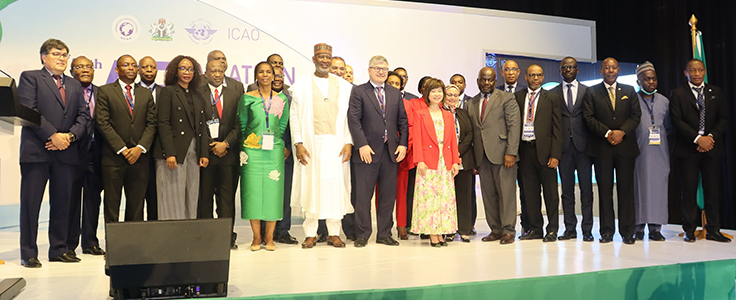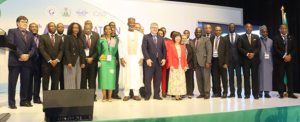
Recently aviation experts from Africa, Indian Ocean (AFI) region and other parts of the world met in Abuja to brainstorm on how to revive air transport in Africa, devastated by huge losses incurred due to Coronavirus pandemic and how to reinforce safety in air transport in the region.
African States, with the assistance of the International Civil Aviation Organisation (ICAO) and support, are achieving significant progress in improving international civil aviation standards, setting new pace in air safety, airport security and overcoming the immediate challenges occasioned by COVID-19 pandemic.
The meeting was 7th Aviation Week involving all African air transport stakeholders in the AFI region and the goal was how to eliminate barriers to air transport also to improve safety in air transport in the region.
It was hosted by the Federal Ministry of Aviation (FMA) in conjunction with the Nigerian Civil Aviation Authority (NCAA) and the International Civil Aviation Organisation (ICAO) and the occasion was graced by the Directors General of Civil Aviation Authorities, Aviation Safety and Security Representatives, Aviation Experts of African-Indian Ocean (AFI) Region Member States, and other Representatives and experts from International/ Regional Organizations.
This year’s AFI week engaged all participants in discussing important issues like progress made in implementing the International Civil Aviation Organisation (ICAO) global and regional Plan, enhancement of aviation performance in all ICAO strategic objectives, key priorities for the coming years, COVID-19 aviation recovery and building back better sector in the region and the outcome of the ICAO High-Level Conference on COVID – 19 (HLCC) 2021 amongst others.
The five-day event ended successfully as Nigeria’s Minister of Aviation, Sen. Hadi Sirika canvassed for a safe, secure and efficient air transport system across African countries.
Sirika said such move would serve as a natural impetus for socio-economic development of the region and a means to support trade and tourism.
He said Nigeria’s determination to host the meeting was borne out of the desire to support the growth of air transport in the region.
“It is also a part of ICAO’s efforts in facilitating the recovery process of the industry from the unprecedented impact of the COVID-19 pandemic.This is why this meeting is important to review the impact of COVID-19 pandemic and to take cognizance of digitalization and innovation which are now being highly embraced by the industry,” he said.
The Minister added that such efforts to strengthen air transport system in Africa would also complement the Single African Air Transport Market and other initiatives of Agenda 2063 of the African Union.
The Minister said that COVID-19 management leadership based on collaboration and coordination with Member States and stakeholders ought to be commended.
He said that the ICAO’s leadership had encouraged Member States to collaborate and pool resources in resolving challenges, particularly in the area of enhancing safety in the Sub-region.
COVID-19
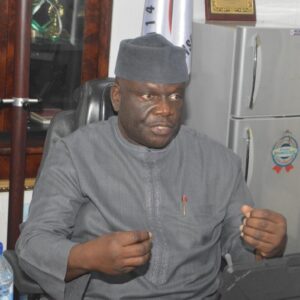
African Union Commissioner for Infrastructure, Dr. Amani Abou-Zeid kicked off discussion on the COVID-19 pandemic, which he said has caused devastating impacts on the lives and livelihoods of countries all over the world and the aviation industry, leading to deep losses and reductions in GDP, jobs, access to finance, and industry revenue.
He said that the rapid progress in the administration of vaccines has offered hope of an end to the worst of the damage caused by the pandemic, but there are many challenges to achieve the target of 60 per cent of vaccination rate in Africa by end of 2022 as set by the Africa CDC (Centre for Disease Control).
He noted that the economic and social impacts of the pandemic on African countries and the industry become more severe such that waiting for a full vaccine roll out is not a sustainable option.
“This aviation week should provide an opportunity to exchange on key challenges affecting the restart and recovery of the air transport industry. According to recent statistic from IATA, over the past year, governments around the world have provided over $400 billion to airlines to support their survival and restart efforts, given the importance of aviation to economies.
“In Africa, the total estimated amount of the financial relief measures provided to airlines in Africa was only $2,721,539,647 (almost $2.7 billion) by end of 2021. This included the government support in the form of providing loans, guarantees, wage subsidies, and direct cash injections to airlines: $2,638,765,827 (almost $2.6 billion),” Dr Abou-Zeid said.
He stated that the African Union Commission continue to urge African States and her key development finance institutions to further support African airlines, using many forms including deferral of charges and taxes whenever possible, sovereign guarantees for private airlines, wage subsidies and other payment support.
“The AU Taskforce on safe reopening of borders is also working on harmonizing the existing digital platforms for traveler health credentials and border requirements. It is also important to ensure that the adopted platforms are interoperable and are recognised by other regions to address the issue of restrictions to travel within or out of Africa. On this note, AUC (African Union Commission) is urging governments to continue to provide timely and accurate updates on their health protocols or requirements and to continue to provide digital COVID-19 vaccination certificates.
“The operationalisation of the SAATM is still among our key priorities to ensure sustainable restart and recovery of the industry and also improve air transport connectivity in support of the AfCFTA (African Continental Free Trade Area). I am glad to inform you that AUC finalized a continental study on the benefits of SAATM (Single African Air Transport Market), which is now serving as advocacy tool to urge remaining States to join SAATM,” he said.
Human Resources Development
In his introductory speech, Sirika also called on the International Civil Aviation Organisation to ensure the revival of the Human Resource Development Fund (HRDF), which has become inactive in the past four years.
He appealed to the African Civil Aviation Commission (AFCAC) and other stakeholders on the continent to pressurise the ICAO Secretary General to use his good offices to revive the fund, which had remained inactive since 2018.
According to Sirika, Nigeria was one of the major contributors to the fund, which primary purpose was to train technical personnel for the industry, stressing that personnel trained on this programme had gained tremendous knowledge about the industry in the past years.
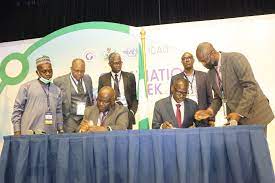
HRDF is expected to provide a mechanism, which would allow for the collection and use of voluntary contributions from states and other donors to identify and develop opportunities for capacity building in civil aviation in African States.
Sirika said the fund would assist them (African States) to better meet the human resource needs required for operational efficiency and continuous implementation of ICAO’s Standards and Recommended Practices (SARPs) and other programme activities, and which would enable safe and reliable air transport for African States, thereby contributing to the social and economic development in the African region.
The funds were contributed voluntarily by member states and were meant for capacity building.
Sirika said: “I wish to seize this opportunity to appeal to Member States here present and the African Civil Aviation Commission (AFCAC) and to call on the ICAO Secretary General to use his good offices to revive the ICAO Human Resource Development Fund (HRDF), which has remained inactive since 2018.
“Nigeria generously contributed to this fund and equally benefited from the inaugural secondment of officers to ICAO under this programme. The exposure, experience and knowledge gained by the officers attest to the usefulness of the HRDF programme.”
Sirika further reiterated the support of Nigeria to ICAO’s initiatives and collaborate with member states and development partners on the development of air transport in Africa.
Fly Green Programme
The Director General of the Nigeria Civil Aviation Authority (NCAA), Captain Musa Nuhu, in his presentation at the event said that Nigeria wasfaced with a host of climate change challenges, including the highest deforestation in African sub-region, so it is initiating the Fly-2-Green Nigeria Program to help carbon emission reduction.
He stated hat the programme was engineered to launch the first Green Aviation Marketplace program in Africa and promote progressive possibilities that profit the people and the planet through climate smart, efficient programmes that guarantee Green and Blue Economic Growth for the United Nations Global Green Goals Agenda.
Nuhu, who spoke on the theme: Green Flight to Eco-System Conservation in Nigeria Mobilizing Market-Based Measures for Sustainable Aviation in Nigeria, said research indicates that the African continent which is responsible for less than 3 per cent of global emissions would bear the brunt of over 60 per cent of global Green-House Emissions effects.
He said this would leave the continent exposed to myriad of socio-economic, environmental, security and humanitarian challenges from desertification, the drying up of Lake Chad and Blue Bio-diversity losses within Pan-African wetlands and ocean shorelines stressing that it was time for Africa to put a ‘Green Foot forward’.
“Nigeria is home to a host of climate change challenges, most of all bio-diversity degradation and pollution. Nigeria holds the record for the African country with the highest deforestation rate hence, the urgency to mobilize a common but differentiated Sustainable Aviation Solution for Nigeria that is designed specifically to ensure Bio-Diversity Conservation and Restoration across our communities.
“Green-Sky-Green is the first Eco-Citizen Flyer Miles program that deploys incentive-based voluntary Eco Label tokens to mitigate Aviation Industry Carbon Emission Footprint beyond the ICAO’s CORSIA (Carbon Offsetting and Reduction Scheme for International Aviation) scheme in Nigeria through Forest Impact programs that guarantee Bio-Diversity and Eco-System conservation to combat desertification and protect wetlands for SDG Goals 14 and 15.
“The Green-Sky-Green program is a voluntary carbon emission reduction program that empowers Eco- Citizen travelers to grow 10 trees for every domestic ticket and 100 trees for every international ticket purchased in Nigeria,” Nuhu said.
According to Nuhu, the Fly-2-Green Nigeria is designed as an Eco-Citizen stimulus program that goes beyond open lifestyle incentives to create shared values, shared visions and shared possibilities that rally Eco Consumer driven Sustainable Aviation Value Chain Marketplace to drive Net Zero Emissions Footprint for the Aviation Industry.
He revealed that the Fly-2-Green Nigeria product promotes progressive partnerships and possibilities that profit the people and the planet through a smart Eco-Citizen Flyers Empowerment program that drives Future Forest Footprint projects through Green Sky Miles that guarantee 100 million Fly-2-Green Carbon Neutral tickets totaling over 10 billion Eco-Citizens Flyer Miles to plant over 1 billion trees across Nigerian in 10 years in commemoration of the United Nations Decade for Eco-System Restoration in Nigeria.
SAATM
Speakers at the event emphasised the effective implementation of the Single African Air Transport Market (SAATM) as a flagship project of the African Union Agenda 2063, an initiative of the African Union to create a single unified air transport market in Africa to advance the liberalization of civil aviation in Africa and act as an impetus to the continent’s economic integration agenda.
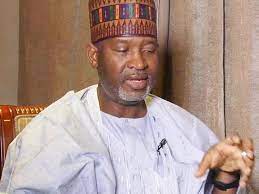
They stated that SAATM would ensure aviation plays a major role in connecting Africa, promoting its social, economic and political integration and boosting intra-Africa trade and tourism as a result. According to the International Air Transport Association (IATA), SAATM was created to expedite the full implementation of the Yamoussoukro Decision.
IATA fully supports this initiative, which is expected to open up Africa’s skies and promote the value of aviation throughout the continent. Opensair arrangements boost traffic, drive economies and create jobs. An IATA Survey suggested that if just 12 key Africa countries opened their markets and increased connectivity, extra 155,000 jobs and $1.3 billion in annual GDP would be created in those countries.
The highlight of the meeting included the signing of Memorandum of Understanding (MOU) between Nigeria, Rwanda and Sierra Leone on air transport cooperation.


